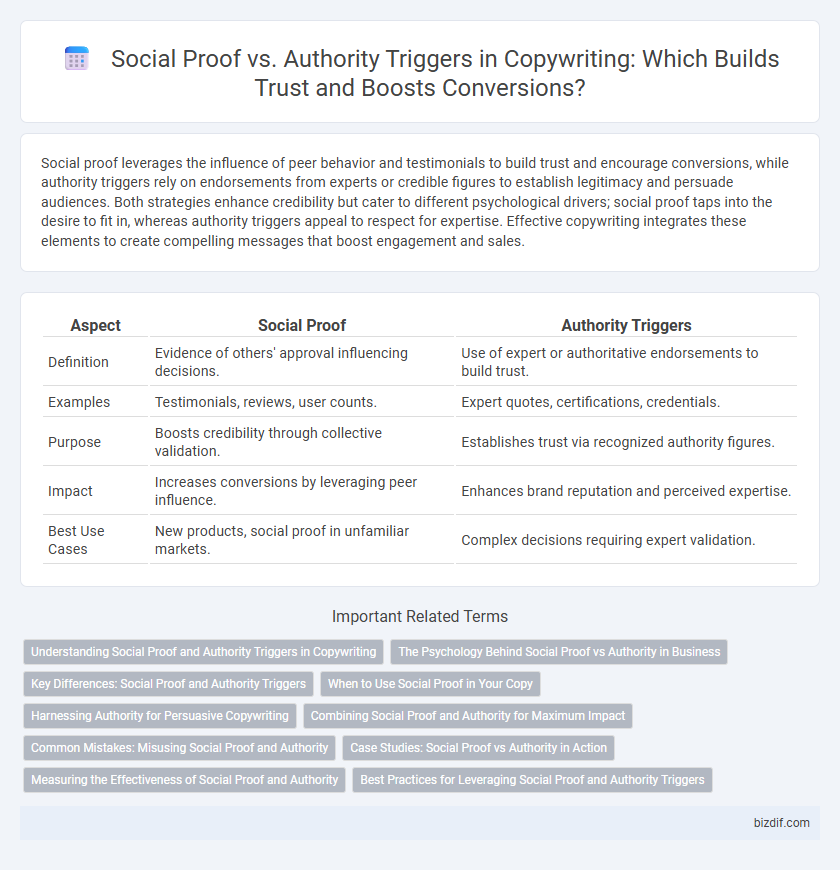Social proof leverages the influence of peer behavior and testimonials to build trust and encourage conversions, while authority triggers rely on endorsements from experts or credible figures to establish legitimacy and persuade audiences. Both strategies enhance credibility but cater to different psychological drivers; social proof taps into the desire to fit in, whereas authority triggers appeal to respect for expertise. Effective copywriting integrates these elements to create compelling messages that boost engagement and sales.
Table of Comparison
| Aspect | Social Proof | Authority Triggers |
|---|---|---|
| Definition | Evidence of others' approval influencing decisions. | Use of expert or authoritative endorsements to build trust. |
| Examples | Testimonials, reviews, user counts. | Expert quotes, certifications, credentials. |
| Purpose | Boosts credibility through collective validation. | Establishes trust via recognized authority figures. |
| Impact | Increases conversions by leveraging peer influence. | Enhances brand reputation and perceived expertise. |
| Best Use Cases | New products, social proof in unfamiliar markets. | Complex decisions requiring expert validation. |
Understanding Social Proof and Authority Triggers in Copywriting
Social proof in copywriting leverages customer testimonials, reviews, and user-generated content to build trust and influence potential buyers by showcasing real experiences and social validation. Authority triggers rely on credible endorsements, expert opinions, and authoritative sources to establish expertise and increase the perceived value of a product or service. Combining social proof and authority triggers strategically enhances persuasive messaging by appealing to both relational trust and expert credibility.
The Psychology Behind Social Proof vs Authority in Business
Social proof leverages the psychological tendency of individuals to look to others' actions and opinions as a guide for their own behavior, enhancing trust through consensus and shared experiences. Authority triggers tap into the deep-rooted respect for expertise and credibility, where endorsements from recognized figures or institutions increase perceived value and influence decision-making. Understanding these psychological drivers helps businesses strategically utilize social proof and authority to build credibility, boost conversions, and foster customer loyalty.
Key Differences: Social Proof and Authority Triggers
Social Proof leverages the behavior and testimonials of peers or large groups to build trust and influence decisions, whereas Authority Triggers rely on endorsements or credibility from experts, celebrities, or authoritative figures. Social Proof thrives on collective validation, such as customer reviews and case studies, while Authority Triggers depend on recognized credentials or positions of power to establish trust. Understanding these distinctions helps craft persuasive copy that targets the appropriate psychological motivator for the audience.
When to Use Social Proof in Your Copy
Social proof is most effective in copywriting when potential customers face uncertainty or hesitation about a product or service, as showcasing testimonials, reviews, and user-generated content builds trust and credibility. It works well during the decision-making phase, especially for new or lesser-known brands trying to prove their value through real customer experiences. Incorporating social proof strategically improves conversion rates by leveraging the influence of peers and validating purchase decisions.
Harnessing Authority for Persuasive Copywriting
Harnessing authority triggers in persuasive copywriting establishes credibility by showcasing expert endorsements, certifications, or industry accolades that resonate with the target audience's trust mechanisms. Leveraging authoritative figures or data-driven credentials enhances conversion rates by positioning the message as reliable and influential. Unlike social proof, which relies on peer validation, authority triggers command respect and instill confidence through recognized expertise.
Combining Social Proof and Authority for Maximum Impact
Combining social proof and authority triggers enhances copywriting effectiveness by leveraging both trust and credibility to influence consumer behavior. Social proof, demonstrated through testimonials, reviews, or user-generated content, establishes widespread approval, while authority, conveyed via expert endorsements or industry certifications, reinforces expertise and reliability. Integrating these elements creates a compelling message that maximizes persuasion and conversion rates by appealing to both emotional and rational decision-making processes.
Common Mistakes: Misusing Social Proof and Authority
Misusing social proof often involves relying on irrelevant or outdated testimonials, which can erode trust instead of building it. Authority triggers are less effective when the perceived expert lacks genuine credentials or connection to the product, causing skepticism among consumers. Balancing authentic social proof with credible authority signals ensures persuasive and trustworthy copy that enhances conversion rates.
Case Studies: Social Proof vs Authority in Action
Case studies demonstrate that social proof leverages customer testimonials and user-generated content to build trust through peer validation, while authority triggers rely on expert endorsements and recognized credentials to establish credibility. Brands utilizing social proof report increased conversion rates by showcasing relatable experiences, whereas authority-based strategies enhance perceived expertise and reliability. Combining both approaches in marketing campaigns maximizes influence by addressing emotional trust and logical trust simultaneously.
Measuring the Effectiveness of Social Proof and Authority
Measuring the effectiveness of social proof involves tracking metrics such as conversion rates, click-through rates, and customer engagement to determine how peer influence drives consumer behavior. Authority triggers are evaluated by assessing increases in credibility signals, brand trust scores, and lead generation attributed to endorsements from experts or influential figures. Combining analytics tools and A/B testing provides concrete data on which trigger--social proof or authority--more effectively boosts sales and fosters customer loyalty.
Best Practices for Leveraging Social Proof and Authority Triggers
Utilize social proof by prominently displaying verified customer testimonials, case studies, and user-generated content to build trust and authenticity. Incorporate authority triggers through endorsements from industry experts, certifications, and media mentions to enhance credibility and influence buying decisions. Combine both by aligning social proof with authoritative validation, ensuring the messaging resonates with your target audience's desire for reliability and social validation.
Social Proof vs Authority Triggers Infographic

 bizdif.com
bizdif.com